How to become a freelancer and earn online?
Aneh Thakur
. 4 min read

What is freelancing?
Freelancing is a type of work where individuals offer their services on a project-by-project basis, rather than working as an employee for a single employer. Freelancers are self-employed and can work for multiple clients at the same time. They may offer a variety of services, such as writing, design, programming, marketing, and more.
Freelancers typically have more flexibility and control over their work schedule and projects than traditional employees do. However, they may also face greater uncertainty and have to work harder to find and secure new clients.
Freelancing can be a great option for people who want to be their own boss and have the freedom to choose their own projects and clients. It can also be a good option for people who want to supplement their income or try out different types of work.
There are many ways to become a freelancer and earn money online. Here are some steps you can follow to get started:
- Identify your skills and expertise: What do you enjoy doing? What are you good at? Identifying your skills and expertise will help you determine what type of work you can offer as a freelancer.
- Determine your target market: Who do you want to work with? What type of clients or industries are you interested in? Understanding your target market will help you tailor your services and marketing efforts to attract the right clients.
- Build a portfolio: As a freelancer, your portfolio is an important tool for showcasing your skills and experience. Consider creating a website or online portfolio to showcase your work and highlight your accomplishments.
- Find freelance work: There are many ways to find freelance work, including job boards, freelance marketplaces, and networking. Consider creating a profile on a freelance marketplace such as Upwork or Freelancer, or use social media and professional networking sites to connect with potential clients.
- Set your rates: Determine how much you want to charge for your services, taking into account the value you bring to your clients and the market rates for similar services.
- Promote your services: Once you have identified your skills, target market, and rates, start promoting your services to potential clients. This may include creating a website or social media presence, networking with potential clients, and showcasing your portfolio.
Top freelancing website where you can earn online?
There are many websites that offer freelance work opportunities. Some of the top websites for finding freelance work include:
- Upwork: Upwork is a popular freelance marketplace that connects businesses and clients with freelancers in a variety of fields, including writing, design, marketing, and more.
- Freelancer: Freelancer is a global freelancing platform that allows businesses and individuals to find freelancers for a variety of projects, including web and mobile development, writing, and design.
- Fiverr: Fiverr is a popular platform for finding freelance services in a variety of categories, including graphic design, writing, marketing, and more.
- PeoplePerHour: PeoplePerHour is a UK-based platform that connects businesses with freelancers for a variety of services, including web and app development, writing, and marketing.
- Toptal: Toptal is a platform that connects businesses with top-tier freelancers in fields such as software development, design, and finance.
- LinkedIn: LinkedIn is a professional networking site that also has a job board where companies and individuals can post freelance work opportunities.
By using these websites, you can find freelance work in a variety of fields and connect with potential clients from around the world. It's important to carefully review the terms and conditions of each platform and to do your due diligence before accepting any freelance work.
What benefits of freelancing?
- Flexibility: As a freelancer, you have the freedom to choose your own projects and schedule. This allows you to work on your own terms and to fit your work around your personal commitments.
- Control over your career: As a freelancer, you have the ability to choose the types of projects you work on and the clients you work with. This gives you greater control over your career and the direction it takes.
- Opportunity to work on a variety of projects: Freelancing allows you to take on a wide range of projects, which can help you gain diverse experience and skills.
- Potential to earn more money: Freelancers often have the ability to charge higher rates for their services than employees, which can lead to higher earnings.
- Opportunity to work remotely: Many freelancers work remotely, which allows them to have greater flexibility and the ability to work from anywhere with an internet connection.
While freelancing can offer many benefits, it can also come with its own set of challenges, such as the need to manage your own finances, find your own clients, and handle your own taxes. It's important to carefully consider the pros and cons of freelancing before making the decision to pursue it as a career.
Drawbacks for freelancing?
Freelancing can come with its own set of challenges, including:
- Lack of job security: As a freelancer, you don't have the same level of job security as an employee. Your income may fluctuate and you may not have a guaranteed steady stream of work.
- Responsibility for your own finances: As a freelancer, you are responsible for managing your own finances, including paying your own taxes and setting aside money for retirement.
- Need to find your own clients: As a freelancer, it's up to you to find your own clients and secure new projects. This can take time and effort and may require marketing and networking efforts.
- Limited benefits: Freelancers may not have access to the same benefits as employees, such as healthcare, paid time off, and retirement plans.
- Lack of support: Freelancers may not have the same level of support as employees, such as a team or manager to turn to for guidance or assistance.
While freelancing can offer many benefits, it's important to carefully consider the potential challenges and to be prepared to manage them in order to succeed as a freelancer.




